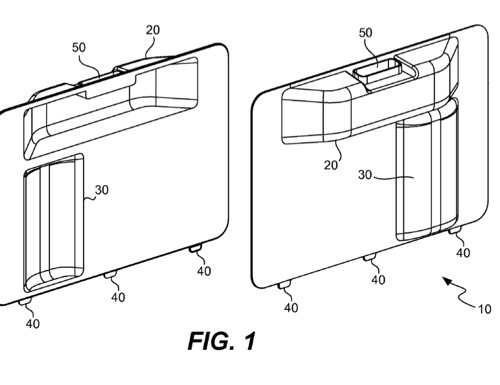Apple is eyeing ways to improve air cooling techniques for its computers, including the Mac Pro. An Apple patent (number 7849302) for an apparatus for air cooling has appeared at the US Patent & Trademark Office.
An apparatus for air-cooling an electronic device is disclosed in the patent. A contoured panel channels a flow of air within the housing of an electronic device so as to channel the flow of air more directly over heat producing elements such as the microprocessor and peripheral cards. A sensor can also be employed to determine whether the panel is present and properly placed. If not, measures can be taken to reduce the heat generated by the heat producing elements. For example, a warning can be displayed, or the microprocessor can be instructed to enter sleep mode. Steven Holmes and Douglas L. Heirich are the inventors.
Here’s Apple’s background and summary of the invention: “As electronic devices increase in processing power and speed, their processors generate more and more heat, thus exacerbating wear and tear on various components due to thermal cycling and otherwise compromising their performance. Such temperature-related problems only continue to grow as processor speeds continue their steady march upward. The cooling of these processors, and other heat producing elements, has therefore become an important issue affecting the performance of modern electronic devices such as computers.
“To this end, methods have been applied in the past to reduce the operating temperatures of electronic devices. For example, various liquid cooling systems have been employed to cool processors with water or other liquids. However, liquid cooling systems are typically bulky, expensive, and upon leaking, risk severe damage to the electronic devices in which they are installed. Fans for air cooling are another common solution to the problem of excessive heat generation. Such fans are an inexpensive and relatively reliable solution, and do not suffer from some of the drawback of liquid cooling systems, such as the risk of leaks. Ongoing efforts thus exist to improve the effectiveness and cooling ability of air cooling systems.
“Broadly speaking, the invention pertains to improving the air cooling of electronic devices. A contoured panel is employed to channel the flow of air from a fan more directly onto an electronic device’s sources of heat. In this manner, the heat dissipation ability of existing air cooling devices is increased without increasing their fan speeds, or any other parameters which may have potentially detrimental effects such as increased power consumption, noise generation, or the like.
“The invention can be implemented in numerous ways, including as a method, system, device, apparatus, or computer readable medium. Several embodiments of the invention are discussed below.
“As a contoured panel for directing a flow of air within an electronic device, one embodiment of the invention comprises a panel configured to be removably placed proximate to an electronic device, the electronic device having a heat producing element and a fan, the panel further having a contoured portion configured to be placed proximate to the fan so as to direct a flow of air from the fan across the heat producing element, the flow of air facilitating the cooling of the heat producing element.
“As an air-cooled electronic device, one embodiment of the invention comprises a housing and a microprocessor and a fan within the housing. The panel is configured to be removably placed proximate to the housing. The panel also has a contoured portion configured to direct a flow of air from the fan across the microprocessor so as to cool the microprocessor.
“As an electronic device housing, one embodiment of the invention comprises a first portion configured to support a microprocessor, and a second portion configured to support a first fan. A removable, contoured portion configured to direct air from the first fan across the microprocessor, so as to cool the microprocessor.”
— Dennis Sellers

